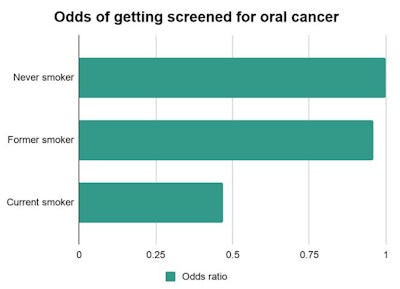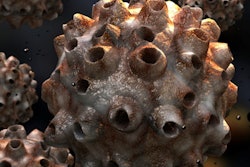
How often do you screen patients for oral cancer? Probably not often enough, according to the findings of a study published in the December issue of the Journal of the American Dental Association.
About 25% of U.S. adults remember receiving a screening for oral and oropharyngeal cancer at the dental office. However, current smokers and other high-risk individuals were even less likely to get screened by a dentist or dental hygienist.
"Today, delivery of smoking cessation counseling and [oral cancer] and [oropharyngeal cancer] screenings are recommended as primary and secondary prevention strategies for oral healthcare providers," wrote the authors, led by Jevae Nelson, DDS, a senior doctoral candidate at the Harvard School of Dental Medicine (JADA, December 2019, Vol. 150:12, pp. 995-1003). "Patients at high risk, including those with a long duration of tobacco use, can benefit from earlier diagnosis of cancer if they receive timely screenings by trained oral healthcare professionals."
Importance of prevention
Oral cancer screenings can help to identify oral and oropharyngeal cancer in the earliest stages when patients have the greatest odds of a cure. Many organizations, including the ADA, advise that dentists routinely screen all patients for both oral and oropharyngeal cancer, but previous research has suggested that patients may not be getting screened as often as recommended.
For their study, the researchers used data from the 2015-2016 National Health and Nutrition Examination Surveys, which are designed to provide nationally representative data about the health status of children and adults in the U.S. They included about 5,500 respondents who had previously visited the dentist or another type of oral healthcare professional.

About 1 in 4 U.S. adults age 30 and older said they were screened for oral cancer by a dentist or dental hygienist. However, the odds of receiving an oral cancer screening varied by income, race, age, and smoking status.
Despite being at an increased risk for oral cancer, adults who currently smoked cigarettes were about half as likely to have been screened for oral cancer at the dental office than those who had never smoked. Racial and ethnic minorities and people with less than a high school education also were less likely to be screened for oral cancer.
“Screening practices among high-risk groups continue to vary.”
"Screening practices among high-risk groups continue to vary, as established by the [National Health Interview Survey] Cancer Control data decades ago," the authors wrote. "After more than 25 years, minority participants who are current cigarette smokers, less educated, and living at 400% or more of the [federal poverty guidelines] continue to be less likely to receive an [oral cancer] and [oropharyngeal cancer] screening."
The somewhat good news? Current and former smokers were somewhat more likely to be counseled about smoking cessation. Almost half of the respondents who smoked said their dentist or another oral healthcare professional spoke to them about the oral health benefits of quitting tobacco.
Continuing to learn
It is important to note that the researchers did not have access to respondents' dental records, and respondents may have incorrectly remembered whether they received an oral cancer screening at the dental office. The study also did not include participants who used tobacco products other than combustible cigarettes.
The authors recommended that dentists continue to screen for oral cancer, especially as the number of patients with HPV continues to increase. They also hoped that dental school curriculums and continuing education classes cover this important topic.
"Oral healthcare providers could benefit from additional continuing education highlighting the risk factors for [oral cancer] and [oropharngeal cancer], screening practices, and counseling workshops," the authors wrote. "Regarding dental education, we suggest emphasizing regular [oral cancer] and [oropharyngeal cancer] screening and tobacco cessation counseling in both didactic and clinical curricula, in conjunction with a tightly linked formative and summative assessment."



















